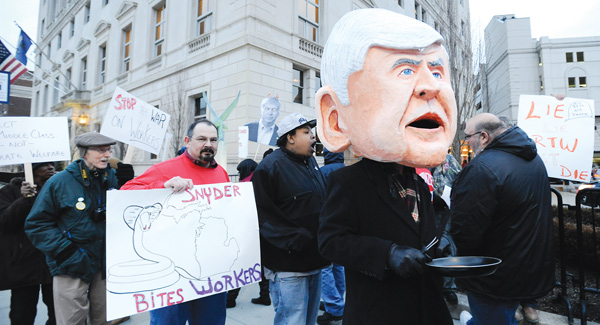Mich. right-to-work law takes effect


Protesters, including one costumed as Gov. Rick Snyder, stand outside the Detroit Athletic Club in Detroit on Thursday. Unionized workers and others protested outside the club as Snyder addressed a “Pancakes & Politics” breakfast. The protesters demonstrated against the right-to-work law that took effect Thursday that allows workers to decide not to pay dues to a union as a condition of employment.
Associated Press
LANSING, Mich.
A right-to-work law is on the books in Michigan, a mainstay of organized labor, but those considering opting out of paying union dues will have to wait months or years to do so.
The law, which lets workers choose not to pay to the unions that bargain on their behalf, applies to labor contracts that are extended or renewed starting Thursday — meaning many employees will not be affected until existing collective bargaining agreements end.
“I’ve got a long way to go until I can exercise my right,” said Terry Bowman, 47, who works on the line at a Ford Motor Co. plant in Ypsilanti. Contracts between unions and Detroit automakers are effective until September 2015.
Bowman, who founded a group called Union Conservatives, said he is leaning toward ending his membership in the United Auto Workers — of which he has been a member since 1996 — unless it drops its “political agenda.” He said there are many more blue-collar people like him, but they are scared to publicly support right-to-work because of pressure from union leaders after the law won quick approval in December from the GOP-led Legislature and Republican Gov. Rick Snyder.
Though Bowman does not expect a “mass exodus,” he said some unions could lose a quarter of their membership.
Michigan, the 24th right-to-work state, has the nation’s seventh-highest percentage of unionized workers. Peer pressure and tradition may go a long way to keep the larger, more- established unions intact. The UAW, for example, has been intertwined in Michigan’s culture of manufacturing cars and trucks for 77 years.
Neighboring Indiana enacted a right-to-work law in February 2012. The early results: Union membership declined to 9.1 percent of the workforce last year from 11.3 percent in 2011, according to federal statistics — a loss of 56,000 people. Most of Indiana’s unions have not yet seen a big drop-off in membership, but many contracts still are in place from before the law took effect.
The declines may indicate more of a national trend, as membership across the U.S. has shrunk to its lowest levels since at least the 1930s — a paltry 6.6 percent in the private sector.
In Michigan, union membership dropped to 16.6 percent from 17.5 percent a year earlier, a decline of 42,000.
 43
43
